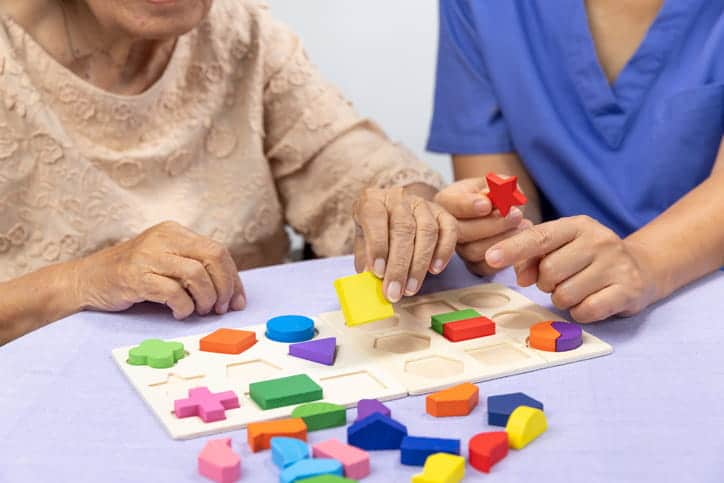In 2022, as many as 4% of people 65 years old and older had been diagnosed with dementia (including Alzheimer’s disease), according to a 2024 National Health Statistics report. For the 11 million Americans who are dementia and Alzheimer’s caregivers living overstressed due to providing this unpaid care (according to The Alzheimer’s Association (ALZ)), the need for memory care services can be a much-needed respite.

The ALZ notes that as many as 70% of caregivers report “coordinating care” as a source of stress, and 74% said that maintaining their own health has become a concern since becoming a caregiver. Luckily, there are resources for Alzheimer’s care in Arizona that can make this living situation easier for patients and their loved ones.
What Is Memory Care?
According to the National Council on Aging (NCOA), memory care is specialized care generally offered in a skilled nursing facility for people struggling with dementia or Alzheimer’s disease.
How Does Memory Care Differ From Traditional Assisted Living?
The NCOA explains that facilities that provide memory care tend to offer all the same services as regular assisted living facilities but also include extra care for those requiring dementia care. These services usually include activities that help with memory, staff specifically trained in dementia care, and increased safety and supervision guidelines.
What Specific Services and Therapies Are Offered in Memory Care Facilities?
The NCOA notes that memory care facilities tend to offer the following services in addition to the usual assisted living services:
- 24-hour supervision
- Specialty staff trained to care for dementia patients
- Meal services (ensuring patients are remembering to eat)
- Medication management services
- Recreational activities
- Memory care services
How Do Memory Care Programs Support Family Members and Caregivers?
Being a caregiver to someone who is experiencing worsening dementia can take a huge toll. The NCOA notes that by seeking memory care in Arizona, you can be assured that your loved one is being cared for, so you can better focus on your own health and your role as a family member or friend rather than a caregiver.
The Benefits of Memory Care in Arizona
Receiving expert care at one of Haven Health’s dementia care Arizona locations offers patients and caregivers the following benefits:
- Peace of mind that your loved one is looked after 24 hours a day
- Gives you and your loved one your previous relationship dynamic back
- Gives patients 24-hour access to assistance
- Personalized care options with access to other services, such as behavioral therapy, physical therapy, occupational therapy, and more
- Improved quality of life
How Can Memory Care Improve the Quality of Life for Individuals With Alzheimer’s or Dementia?
The staff at Haven Health is committed to patient care that is sympathetic and understanding. Staying at a skilled nursing facility, such as Haven Health, with a staff fully equipped to handle all patient needs, patients suffering from dementia or Alzheimer’s are better able to adhere to a schedule that reduces stress and encourages a healthy lifestyle. When it comes to dementia, a healthy lifestyle and early treatment can assist in delaying the progression of the disease. Senior care facilities can also improve patient’s social lives and help them to stay active and interactive.
How Do Arizona Assisted Living Facilities Ensure the Safety and Well-Being of Memory Care Residents?
At Haven Health, all memory care patients are provided with safety measures, such as:
- Secured entrances and monitored exits
- Memory-friendly layouts
- 24-hour supervision
How Do I Know If My Loved One Needs Memory Care?
According to the ALZ, the following may be warning signs that your loved one is beginning to require memory care:
- Forgetfulness that interferes with daily life, such as forgetting appointments, forgetting important dates, and asking the same questions repeatedly
- Need help with problem-solving
- Trouble completing tasks they once could do easily, such as forgetting simple recipes, forgetting how to get to a familiar location, needing help to make lists, etc.
- Increased confusion
- Difficulty with spatial relationships
- Issues finding the right word(s) when speaking and/or writing
- Frequently misplacing items
- Decision-making issues, such as trouble handling finances and remembering regular grooming practices
- Avoid socializing because of difficulty holding conversations or doing hobbies
- Mood and personality changes, like being suddenly suspicious or getting overly upset at friends and family
What Should Families Consider When Choosing a Memory Care Facility in Arizona?
The NCOA recommends considering the following factors when choosing the best assisted living facility for memory care for your loved one:
- Does the assisted living facility offer the ideal setting? Ensure the setup and amenities offered include everything your loved one wants and needs to be comfortable.
- Does the staff seem knowledgeable, and do they have the proper credentials? Ensure that the staff is properly trained in dementia-specific training.
- What is offered for social interaction and recreational activities? Social engagement and enjoyable activities are important for anyone but can be especially important to dementia patients who require engagement and a routine.
- Will long-term care also be an option if/when your loved one’s condition worsens? Dementia tends to worsen over time. Knowing if the nursing facility could potentially be a permanent living situation is good information to have.
Dementia is a difficult thing for anyone to handle. By helping your loved one get memory care services, you can help to improve their quality of life and stave off the disease as long as possible.
Are you looking for an assisted living facility near you? Contact Haven Health today to learn about your options for personalized patient care.
Sources:
Alzheimer’s Disease Facts and Figures. (n.d.).
Kramarow, E. (2024). Diagnosed Dementia in Adults Age 65 and Older: United States, 2022.
10 Early Signs and Symptoms of Alzheimer’s and Dementia. (n.d.).
What is Memory Care? (2023).